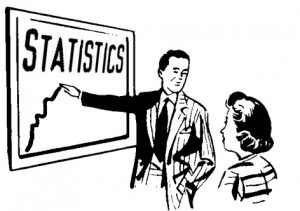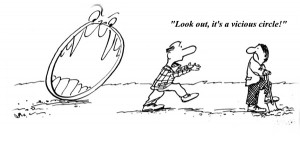Hello my indie friends, it’s time to gather around for story time again. For those who’ve come by here looking for more wisecracks about Vampires, that’ll be tomorrow. But I had a thought about something that stuck with me and I need to get it out of my system. I know most times when I get talking like this I start making broad stroke abstract statements about the potential of a better tomorrow and achieving our dreams. But today I’m talking about statistics!
No, no, I wont get into numbers. But I think that it’s something that everyone should probably hear because I know it’s been bugging me lately too. I’ve already talked once before about how you’re going to find a lot of people telling you that you’re going to fail. Usually the loudest voices telling you to give it up and go into something safer are the people who care about you. And, for some of those people, they’re possibly right to do so. After all, numbers don’t lie.
Sometimes they leave out a bit of the truth though.
I’ll cut it to you straight: statistically, you’re going to fail. Statistically, I’m going to fail. Statistically, we’re all going to fail – together! And, let’s face it, that’s incredibly daunting to know. We are in one of the riskiest industries out there. You can release your work and have any number of sorry fates befall it. But, if that were to happen, would it be because of the statistics? Can you fail simply because there’s a statistical chance to fail? Hell no.
Statistics aren’t talking about you. I’m not saying that as some inspirational pep-talk bullshit – I’m saying it because it’s absolutely true. Those statistics, the numbers that convince the people that care about you that you need to stop, are about other people who have already failed. The people who create the numbers that are so easy to use to discourage you are taking the successes and failures of other people and putting those in a number format to show publishers, above all else, the amount of money they should be willing to wager on new talent. But statistics are mostly blind.
 |
| Like the people who make them |
They rarely keep track of why they fail. You will always be told a blind number of how X number of people succeeded vs. Y number of people who tried. But when you try to dig deeper you start to find that things are almost completely vague underneath. Why did some people succeed and other people fail? A lot of studies go into it, and a few results have been helpful, but for the most part no one really has a verifiable answer. There are factors we’ve nailed down, of course, but nothing that unifies them all into a formula you can repeat. In essence, the statistics are a scoreboard and very few people have been watching the game.
And the people who care about you? They’re doing something called risk aversion. Statisticians, economists and pretty much anyone who wants to quantify the human condition study that like crazy, especially for game shows. It’s the part of us, left by evolution, that says “if there’s any chance for danger, it’s time to run”. Some of us would call that cowardice, but it’s not, it’s actually the part of evolution that kept us from being devoured by larger, hungrier carnivores. In ages gone by, the people who are telling you to run right now heard a rustle in the bushes and ran like hell while other people stayed in lunging distance and became a snack.
But that’s where the blind statistics come in. What if you’re standing by the bushes and you happen to have a gun? Should you run then? The people who are feeling that risk aversion are going to say yes because every fiber of their being is telling them to do it. But you’re there and you have the gun, it’s time for you to make the judgment call about whether or not you can squeeze off a shot before Tony eats you.
And when you come down to really thinking about the odds, while holding that imaginary gun, here’s a thought that I want everyone to consider: how many of the “failures” have quit? The statistics don’t go down to the personal decisions that guided the failures, usually. They don’t know if one day the person behind the keyboard suddenly groaned and gave into the concerned pleas of their loved ones. And that leaves a fascinating paradox.
If people concerned about the statistics of your chances use that to convince you to quit: You’ve just become part of the statistic. That means that when someone else down the line is given the same rationale for why they should quit it will be partially because you quit. There’s a term for something like that.
I’m not saying to out right ignore them – just be more thoughtful about why you’re doing things. Don’t determine whether or not you continue ahead on a statistic: determine it by what you think your chances are with that proverbial gun I handed you earlier. Those people who are telling you to stop aren’t trying to hurt or impede you, they’re trying to protect you. And, depending on how you are with that gun…
Sometimes it’s from yourself.
And, of course, if you want to see what I did with the gun, check out my books.











